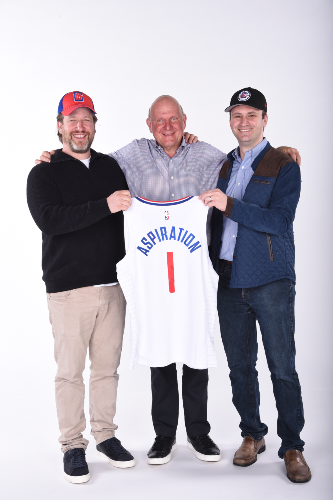The source said the partnership involves Aspiration becoming a jersey sponsor with its name embroidered on a patch worn by a team’s regular season roster of 15 players, starting with the 2023-2024 basketball season.
Aspiration co-founder Joe Sanberg declined to discuss terms of the deal but indicated the partnership is among the first of its kind in the nation.
In the world of sports marketing, jersey patch deals are arguably the most valuable assets next to arena naming rights, and the Aspiration deal would be the longest in the history of the National Basketball Association.
“I’m not aware of another patch deal that’s that long,” said Pete Giorgio, a principal at Deloitte Consulting who leads the company’s U.S. sports practice.
Companies and investors are increasingly linking their investments to environmental, social and governance goals, and the Aspiration deal was in part crafted to help the Clippers with the team’s sustainability initiatives. But as much as these companies might be striving to do good for the world at large, the partnership also makes a lot of business sense, especially as Aspiration looks to grow its customer base.
The embrace of fintechs by sports franchises, especially within the NBA, has much to do with their fans, said Julie VerHage-Greenberg, publisher of Fintech Today, a trade publication in Austin, Texas, that tracks the industry.
“It’s definitely an audience that fintech companies want to reach out to, and I think a lot of these teams are interested in partnering with them, especially in the cryptocurrency space where the athletes themselves are doing partnerships with some of the crypto companies and other fintechs,” VerHage-Greenberg said.
Aspiration is also making moves outside the Clippers deal. It announced plans in August to become a publicly traded company by combining with a blank check firm. The deal with New York-based InterPrivate III Financial Partners Inc. gives the combined company an equity value of $2.3 billion — and $400 million in cash on its balance sheet to fuel new growth initiatives like marketing and further investment in technology.
The companies expect the deal to close in the fourth quarter, before the opening of the new Clippers arena in Inglewood at the start of the 2023-2024 basketball season.
Last month, Mountain View-based Intuit Inc. paid $500 million to lock down naming rights of the $1.2 billion facility.
When Clippers players take to the court of the new 18,000-seat Intuit Dome, the Aspiration patch will be affixed to the upper left chest area of their jerseys, replacing ones that currently have the logo for Honey Science Corp., the downtown-based online coupon company that became a partner last November. The deal with Honey ends at the end of the 2022-2023 season. The jersey patch deal is passed off to Aspiration beginning in the 2023-2024 season.
Leading in assists
As part of the partnership between the Clippers and Aspiration, the companies have established a “planet protection fund” to provide fans with the opportunity to offset their own carbon impact whenever they purchase a ticket to see the Clippers play at the Intuit Dome.
Aspiration, led by Chief Executive Andrei Cherny, has sought to tackle climate change through its services.
The fintech has pledged to its 53 million members that savings and debit card purchases will never be used to fund big-carbon polluters such as the oil or coal industries.
“The origin of this (deal) wasn’t Aspiration seeking an NBA partner; it was Aspiration seeking partners who are aligned with advancing sustainability,” said Aspiration co-founder Sanberg.
In a statement, Clippers spokeswoman Amy Millstone would not confirm the terms of the relationship with the Clippers, and “neither the length nor dollar figure” of the partnership.
The Aspiration partnership wasn’t exactly secret as the company’s CEO attended the Clippers media day on Sept. 27, and other outlets have reported various aspects of the deal that includes the Aspiration logo appearing around the stadium.
The team has embarked on some sustainability initiatives of its own. The Clippers plan to power the Intuit Dome with electricity generated by solar panels and save nearly 10 million gallons of water annually through conservation and the use of reclaimed water.
Experts in the field see the deal as a template on how sport franchises partner with private-sector businesses going forward.
“If this is successful and it does well, it will absolutely be replicated,” said Giorgio, whose client list at Deloitte includes the NBA, the U.S. Olympic & Paralympic Committee, U.S. Tennis Association and U.S. Golf Association.
Verhage-Greenberg agrees that the Aspiration deal could be trendsetting.
“I’d be shocked if we all of a sudden didn’t see any more fintechs doing partnerships or any more deals with extra things involved with sustainability,” she said.

